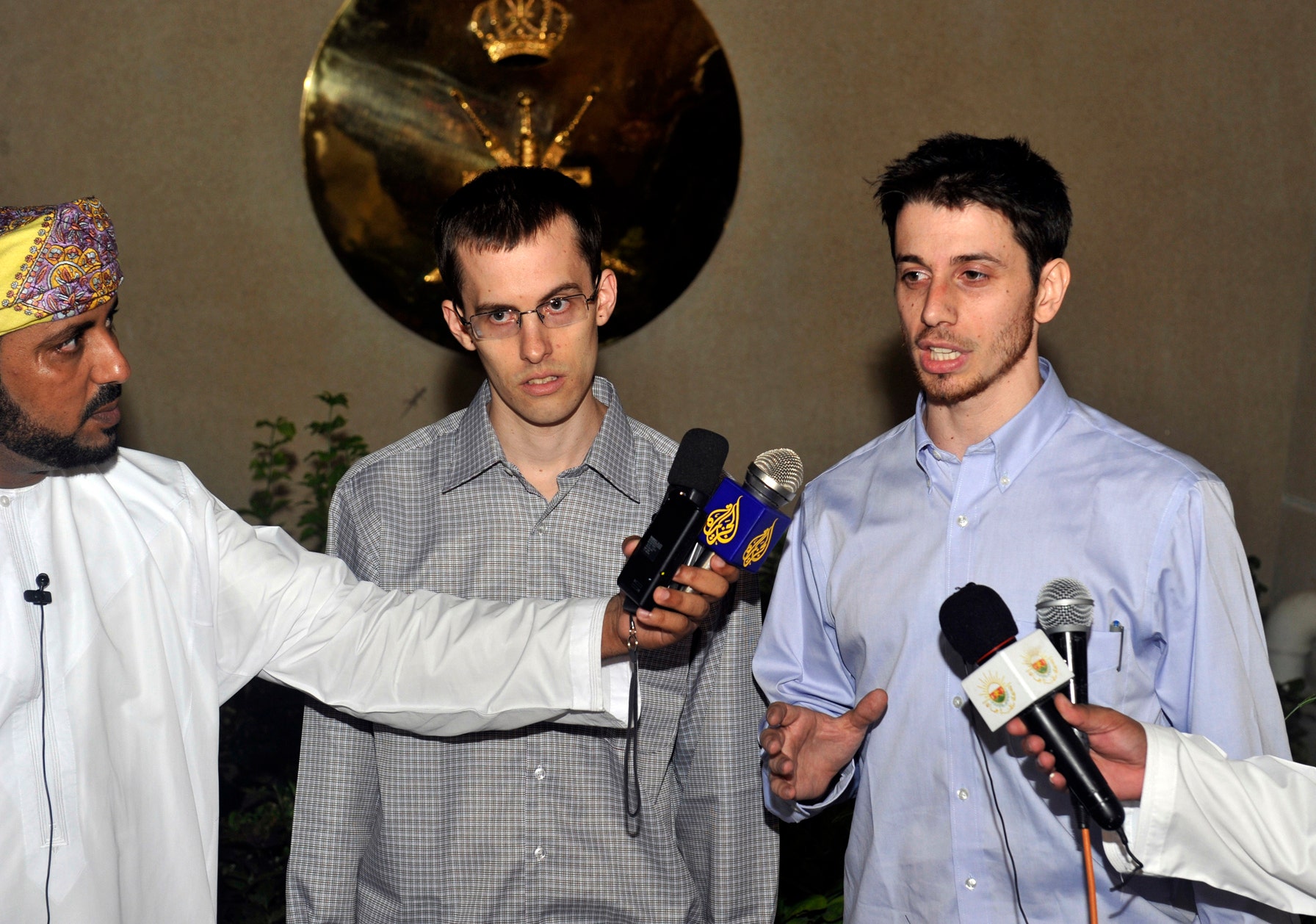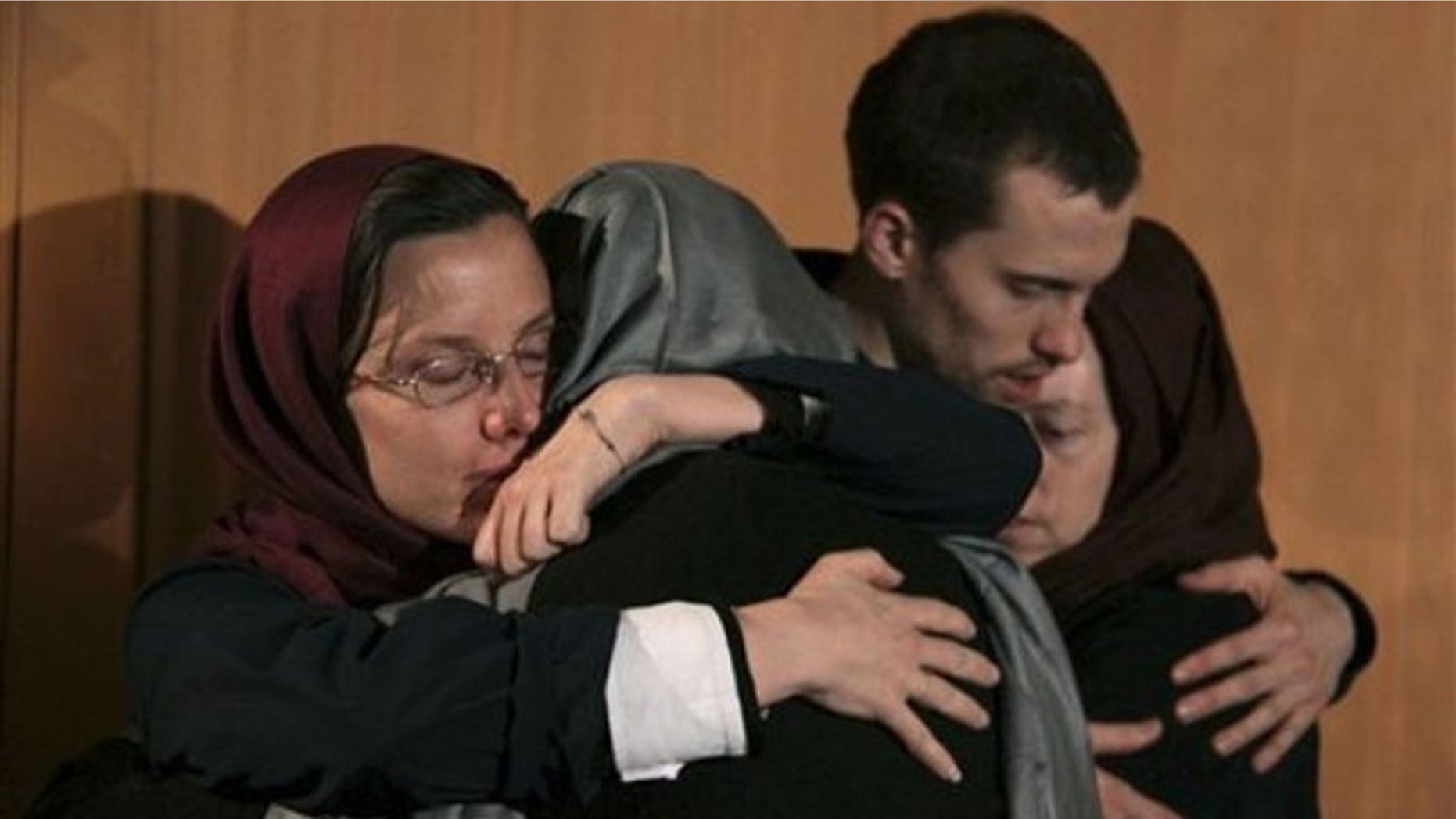When Adventure Turns Perilous: The American Hikers Arrested In Iran
**Table of Contents:** 1. [A Journey into the Unknown: The Unforeseen Arrest](#a-journey-into-the-unknown-the-unforeseen-arrest) * [The Moment of Capture: A Border Blunder](#the-moment-of-capture-a-border-blunder) 2. [The Faces Behind the Headlines: Who Were the Hikers?](#the-faces-behind-the-headlines-who-were-the-hikers) * [Sarah Shourd: The First to Return](#sarah-shourd-the-first-to-return) * [Shane Bauer and Joshua Fattal: Enduring the Ordeal](#shane-bauer-and-joshua-fattal-enduring-the-ordeal) * [Shared Dreams, Unforeseen Nightmare](#shared-dreams-unforeseen-nightmare) 3. [Evin Prison: A Glimpse into Tehran's Notorious Walls](#evin-prison-a-glimpse-into-tehrans-notorious-walls) 4. [The Espionage Charges: A Disputed Narrative](#the-espionage-charges-a-disputed-narrative) 5. [Global Outcry and Diplomatic Efforts](#global-outcry-and-diplomatic-efforts) 6. [A Glimmer of Hope: Sarah Shourd's Release](#a-glimmer-of-hope-sarah-shourds-release) 7. [The Flawed Trial and Lingering Questions](#the-flawed-trial-and-lingering-questions) 8. [Lessons from Captivity: A Sliver of Light and Future Warnings](#lessons-from-captivity-a-sliver-of-light-and-future-warnings)
## A Journey into the Unknown: The Unforeseen Arrest The fateful day was July 31, 2009. Shane Bauer, Sarah Shourd, and Josh Fattal were on what they believed was an innocent and exhilarating hike in the Zagros Mountains of Iraqi Kurdistan. This region, known for its rugged beauty and historical significance, attracts adventurers from around the globe. However, what these three American hikers did not realize was the perilous proximity of an unmarked, often disputed, border. A friend of the three American hikers arrested in Iran later stated his belief that they had no knowledge they were nearing the Iranian border while hiking in Iraq, suggesting it was a simple and regrettable mistake. This sentiment has been echoed by many who followed the case, highlighting the often-unclear demarcation lines in remote and politically sensitive territories. The incident quickly escalated into a major international story, drawing attention to the precarious nature of travel in regions bordering nations with strained diplomatic ties. The news that three young American hikers had been imprisoned by Iran, accused of spying, sent shockwaves through their families, friends, and the global community. It was nearly five years ago that the world first heard of their plight, a story that would unfold over more than two years of uncertainty and intense diplomatic negotiations. The exact circumstances of their arrest remain unclear, shrouded in conflicting reports and the inherent opacity of international incidents involving espionage allegations. ### The Moment of Capture: A Border Blunder According to reports, the American hikers unknowingly crossed a road that bordered Iran. They were stopped by border patrol and subsequently imprisoned in Tehran. Specifically, Bauer’s fiancée, Sarah E. Shourd, and Joshua Fattal were arrested near northern Iraq’s border with Iran in July 2009 by Iranian border guards. Iranian state TV confirmed on a Saturday that Iranian officials had detained three Americans who crossed the border from northern Iraq, stating they failed to heed warnings from border guards. This detail about warnings is disputed by the hikers and their supporters, who maintain their crossing was accidental and unintentional. The swiftness and severity of the Iranian response underscored the high tensions prevalent in the region. For the hikers, what began as a scenic trek transformed into a nightmare of detention in a foreign land, under the shadow of grave accusations. The initial reports from Sulaimaniyah, Iraq, indicated that Baghdad efforts were underway to secure the release of the three American hikers who were arrested in Iran after they crossed the border from the Kurdistan region of Iraq. This immediate diplomatic engagement highlighted the seriousness with which the situation was perceived by both regional and international actors. ## The Faces Behind the Headlines: Who Were the Hikers? Shane Michael Bauer, Joshua Felix Fattal, and Sarah Emily Shourd were more than just names in a headline; they were young Americans with adventurous spirits, whose lives took an unforeseen turn. Their story became a symbol of the complex human cost of geopolitical tensions. While specific personal details are limited in the public record of their arrest, their identities and roles in the incident became central to the global narrative. ### Sarah Shourd: The First to Return Sarah Shourd, a journalist and activist, was one of the three American hikers. Her health became a significant concern during her captivity, leading to international pleas for her release. **Sarah Shourd: Key Details** | Detail | Information | | :---------------- | :------------------------------------------------------------------------ | | Nationality | American | | Role in Incident | One of three hikers arrested | | Arrest Date | July 31, 2009 | | Release Date | September 2010 (after 410 days) | | Release Condition | $500,000 bail, humanitarian grounds (declining health) | | Legal Status | Remained a defendant but not required to return for trial with others | ### Shane Bauer and Joshua Fattal: Enduring the Ordeal Shane Bauer, a freelance journalist, and Joshua Fattal, an environmental activist, remained imprisoned for significantly longer than Sarah Shourd. Their continued detention became a focal point of human rights campaigns and diplomatic efforts. **Shane Bauer: Key Details** | Detail | Information | | :---------------- | :--------------------------------------------------- | | Nationality | American | | Role in Incident | One of three hikers arrested | | Arrest Date | July 31, 2009 | | Release Date | September 2011 (after 781 days, with Joshua Fattal) | | Legal Status | Charged with espionage and illegal entry | **Joshua Fattal: Key Details** | Detail | Information | | :---------------- | :--------------------------------------------------- | | Nationality | American | | Role in Incident | One of three hikers arrested | | Arrest Date | July 31, 2009 | | Release Date | September 2011 (after 781 days, with Shane Bauer) | | Legal Status | Charged with espionage and illegal entry | ### Shared Dreams, Unforeseen Nightmare These three individuals, sharing a passion for adventure and global exploration, found their lives irrevocably intertwined by this single, unforeseen incident. Their collective experience, from the initial shock of arrest to the long, arduous days of captivity, would later be chronicled in their book, "A Sliver of Light," which revealed for the first time their harrowing ordeal of endurance behind bars in Tehran. Their story became a poignant illustration of how personal journeys can intersect with complex geopolitical realities, turning dreams of exploration into a fight for freedom. ## Evin Prison: A Glimpse into Tehran's Notorious Walls Upon their arrest, Shane Michael Bauer, Joshua Felix Fattal, and Sarah Emily Shourd were held without charge or trial at Tehran’s notorious Evin Prison. The very name of Evin Prison evokes images of harsh conditions, political detentions, and human rights concerns. For the American hikers, this was their reality for months, and in the case of Bauer and Fattal, for over two years. The lack of formal charges or a trial in the initial stages fueled suspicions that their detention was, as some suspected, a political ploy. This environment, characterized by uncertainty and isolation, tested their mental and physical resilience to its limits. Evin Prison has a long history of housing political prisoners and those accused of national security offenses in Iran. Its reputation precedes it, making the conditions of their confinement a major point of concern for human rights organizations and international observers. The fact that these young Americans, ostensibly innocent tourists, found themselves in such a place underscored the gravity and the politically charged nature of their situation. The experience within Evin's walls would become a central part of their narrative, shaping their understanding of resilience and the human spirit's capacity to endure. ## The Espionage Charges: A Disputed Narrative From the outset, the Iranian authorities charged the American hikers with espionage and illegal entry. An Iranian state news agency reported on a Monday that three American hikers who were arrested in Iran that summer after straying across its border with Iraq had been accused of spying. However, the facts surrounding the hikers’ arrest were heavily disputed. As stated by critics, Iran’s justice system systematically failed to observe international fair trial standards in this case, including giving the defendants proper legal representation and access to evidence. The ambiguity surrounding the exact circumstances of their crossing only deepened the controversy. While Iranian officials maintained the hikers had crossed illegally and were engaged in espionage, the hikers and their supporters vehemently denied these claims, asserting their crossing was accidental. The narrative put forth by Iran was seen by many as politically motivated, a means to exert leverage in broader international relations, particularly with the United States. This made the legal proceedings, when they eventually occurred, appear less about justice and more about political maneuvering. The accusations of spying against individuals who appeared to be simply tourists sparked widespread condemnation and calls for their immediate release from various international bodies and governments. ## Global Outcry and Diplomatic Efforts The detainment and imprisonment of the three young Americans in Iran quickly became a global issue. This Saturday would mark the one-year anniversary of their detainment, highlighting the protracted nature of their ordeal. Governments, human rights organizations, and concerned citizens around the world joined forces to advocate for their release. Diplomatic channels, often strained between the U.S. and Iran, were cautiously engaged in an attempt to secure their freedom. The families of Shane Bauer, Joshua Fattal, and Sarah Shourd played a crucial role in keeping their plight in the public eye, tirelessly campaigning and appealing to international bodies. Their efforts ensured that the case remained a high-profile humanitarian issue, putting continuous pressure on Iranian authorities. The situation was complex, intertwined with the broader geopolitical landscape, including discussions around Iran's nuclear program and regional stability. Many suspected the hikers were being held for political reasons, making their release contingent on larger diplomatic concessions or gestures. The involvement of various intermediaries, including Oman, was instrumental in facilitating communication and negotiations between the involved parties, demonstrating the intricate nature of such high-stakes international incidents. ## A Glimmer of Hope: Sarah Shourd's Release After 410 days in jail, Sarah Shourd—one of three American hikers imprisoned in Tehran on espionage charges—was released on September 14, 2010, on $500,000 bail. This moment marked a significant turning point in the ordeal, offering a glimmer of hope for the remaining two hikers. Iranian officials stated she was released on humanitarian grounds due to her declining health, a detail that had been a persistent concern throughout her captivity. Her release was a testament to the sustained international pressure and diplomatic efforts. Despite her release, Shourd remained a defendant but was not required by Iran to return for trial along with Fattal and Bauer in 2011. This decision by Iran was interpreted by some as a partial concession, perhaps aimed at alleviating international criticism while still maintaining a degree of legal leverage. Sarah Shourd’s freedom, while celebrated, also underscored the continued uncertainty faced by Shane Bauer and Joshua Fattal, who remained behind bars, their fate still hanging in the balance. Her personal account of the captivity, once shared, would provide invaluable insight into the conditions and psychological toll of their imprisonment. ## The Flawed Trial and Lingering Questions Despite Sarah Shourd's release, the legal saga for Shane Bauer and Joshua Fattal continued. On May 11, Iran was set to resume the flawed trial of the two U.S. hikers, who had by then been held for nearly two years. The ongoing nature of their detention and the accusations against them highlighted the deep-seated mistrust and political complexities between Iran and the United States. The exact circumstances of their arrest remained unclear, but Iranian authorities had charged them with espionage and illegal entry, maintaining their stance despite international appeals. The trial itself was widely criticized by international legal experts and human rights organizations for failing to meet international fair trial standards. The lack of transparency, the disputed nature of the charges, and the prolonged detention without proper legal process raised serious questions about the fairness and legitimacy of the proceedings. Many observers continued to believe that Bauer and Fattal were being held for political reasons, making their trial less about proving guilt and more about political leverage. The drawn-out process, spanning over two years, caused immense distress to their families and became a symbol of the broader diplomatic impasse. Ultimately, after 781 days of captivity, Shane Bauer and Joshua Fattal were also released in September 2011, reportedly after a similar bail arrangement, bringing an end to a protracted and globally scrutinized ordeal. ## Lessons from Captivity: A Sliver of Light and Future Warnings The ordeal of the three American hikers arrested in Iran serves as a profound case study in the perils of international travel, particularly in regions marked by political instability and ambiguous borders. In "A Sliver of Light," the three American hikers seized as hostages in Iran in 2009 reveal for the first time their harrowing experience, offering a unique perspective on endurance behind bars in Tehran. Their story is not just one of survival but also a testament to the power of hope and the resilience of the human spirit. Their experience also brought to light crucial warnings for travelers. Robert Young Pelton, a contributing editor and resident expert on the world’s most dangerous places, offered his take on the three American hikers who got arrested when they stumbled into Iran. His insights, and the broader context of the incident, underscore several critical considerations: * **Political Instability:** Iran is not stable, and neither is the Middle East. Traveling to such regions inherently carries heightened risks, as political tensions can escalate rapidly and unexpectedly. * **Border Ambiguity:** The case highlights the danger of ill-defined or unmarked borders, especially in remote areas. What might seem like an innocent deviation can have severe consequences when crossing into a hostile territory. * **Lack of Due Process:** The systematic failure of Iran’s justice system to observe international fair trial standards in this case is a stark reminder of the legal vulnerabilities faced by foreign nationals in certain countries. * **Geopolitical Context:** The incident was widely seen as a political ploy, demonstrating how individuals can become pawns in larger international disputes. * **Personal Responsibility:** While the hikers maintained their innocence regarding intent, the incident serves as a reminder for travelers to conduct thorough research, heed travel advisories, and exercise extreme caution when venturing near sensitive international borders. As Pelton might suggest, the USA has hundreds of thousands of hiking trails, most of them more beautiful than Kurdistan, and there are many other reasons not to hike where they did. The story of Shane Bauer, Joshua Fattal, and Sarah Shourd is a powerful narrative of adventure gone awry, illustrating the critical importance of situational awareness and the profound impact of geopolitical realities on individual lives. Their courage and perseverance in the face of adversity continue to inspire, while their experience serves as a vital lesson for anyone considering travel to politically volatile regions. The arrest of the American hikers in Iran was a complex saga, blending personal tragedy with international diplomacy and geopolitical tensions. From their accidental crossing into Iranian territory to their prolonged imprisonment in Evin Prison, and the eventual, hard-won releases, their story captivated and concerned the world. It underscored the critical importance of understanding the intricate dynamics of international borders and the profound human cost when adventure intersects with political realities. Their ordeal serves as a compelling reminder for all travelers: while the allure of unexplored territories is strong, the risks in politically sensitive regions can be immense and unpredictable. Always prioritize safety, research extensively, and be aware of the geopolitical climate of your destination. We invite you to share your thoughts on this significant event in the comments below. Have you traveled to regions with complex border situations? What precautions do you take? Your experiences and insights are valuable. If you found this article informative, please consider sharing it with others who might benefit from understanding the nuanced dangers of international travel. For more insights into global safety and travel advisories, explore other articles on our site.

Iran Postpones Trial of Three American Hikers | Fox News

2 Hikers Held in Iran on Flight Home to U.S. | Fox News

Iran Demands U.S. Propose Prisoner Swap for Three U.S. Hikers Labeled